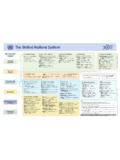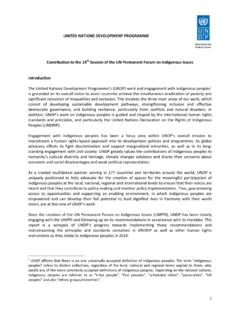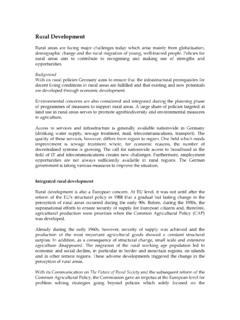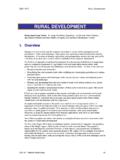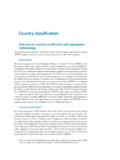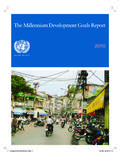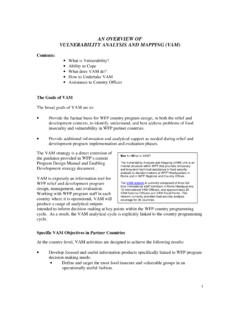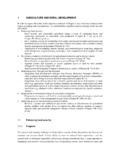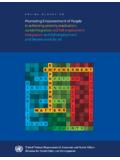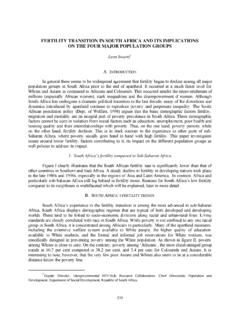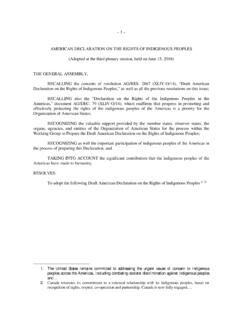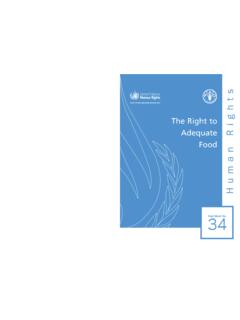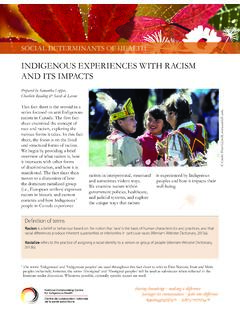Transcription of United Nations Declaration on the Rights of Indigenous …
1 United Nations Declaration on the Rights of Indigenous PeoplesUnited NationsDesigned by the Graphic Design Unit, Department of Public Information, United NationsUnited Nations Declaration on the Rights of Indigenous PeoplesUnited Nations1 Resolution adopted by the General Assembly on 13 September 2007[without reference to a Main Committee (A/61 and )]61/295. United Nations Declaration on the Rights of Indigenous PeoplesThe General Assembly,Taking note of the recommendation of the Human Rights Council contained in its resolution 1/2 of 29 June 20061, by which the Council adopted the text of the United Nations Declaration on the Rights of Indigenous Peoples, Recalling its resolution 61/178 of 20 December 2006, by which it decided to defer consideration of and action on the Declaration to allow time for further consultations thereon.
2 And also decided to conclude its consideration before the end of the sixty-first session of the General Assembly,1 See Official Records of the General Assembly, Sixty-first Session, Supplement No. 53 (A/61/53), part one, chap. II, sect. A. 2 Adopts the United Nations Declaration on the Rights of Indigenous Peoples as contained in the annex to the present plenary meeting 13 September 2007 AnnexUnited Nations Declaration on the Rights of Indigenous PeoplesThe General Assembly,Guided by the purposes and principles of the Charter of the United Nations , and good faith in the fulfilment of the obligations assumed by States in accordance with the Charter,Affirming that Indigenous peoples are equal to all other peoples, while recognizing the right of all peoples to be different.
3 To consider themselves different, and to be respected as such,Affirming also that all peoples contribute to the diversity and richness of civilizations and cultures, which constitute the common heritage of hu-mankind,3 Affirming further that all doctrines, policies and practices based on or advocating superiority of peoples or individuals on the basis of national origin or racial, religious, ethnic or cultural differ-ences are racist, scientifically false, legally invalid, morally condemnable and socially unjust,Reaffirming that Indigenous peoples, in the exer-cise of their Rights , should be free from discrimi-nation of any kind,Concerned that Indigenous peoples have suffered from historic injustices as a result of, inter alia, their colonization and dispossession of their lands, ter-ritories and resources, thus preventing them from exercising, in particular, their right to development in accordance with their own needs and interests,Recognizing the urgent need to respect and promote the inherent Rights of Indigenous peo-ples which derive from their political, economic and social structures and from their cultures.
4 Spiritual traditions, histories and philosophies, especially their Rights to their lands, territories and resources,Recognizing also the urgent need to respect and promote the Rights of Indigenous peoples 4affirmed in treaties, agreements and other con-structive arrangements with States,Welcoming the fact that Indigenous peoples are organizing themselves for political, economic, social and cultural enhancement and in order to bring to an end all forms of discrimination and op-pression wherever they occur,Convinced that control by Indigenous peoples over developments affecting them and their lands, territories and resources will enable them to maintain and strengthen their institutions, cul-tures and traditions, and to promote their devel-opment in accordance with their aspirations and needs,Recognizing that respect for Indigenous knowl-edge, cultures and traditional practices contrib-utes to sustainable and equitable development and proper management of the environment.
5 Emphasizing the contribution of the demilitariza-tion of the lands and territories of Indigenous peoples to peace, economic and social progress and development, understanding and friendly re-lations among Nations and peoples of the world,5 Recognizing in particular the right of Indigenous families and communities to retain shared re-sponsibility for the upbringing, training, educa-tion and well-being of their children, consistent with the Rights of the child,Considering that the Rights affirmed in treaties, agreements and other constructive arrange-ments between States and Indigenous peoples are, in some situations, matters of international concern, interest, responsibility and character,Considering also that treaties, agreements and other constructive arrangements, and the re-lationship they represent, are the basis for a strengthened partnership between Indigenous peoples and States,Acknowledging that the Charter of the United Nations , the International Covenant on Econom-ic.
6 Social and Cultural Rights2 and the Interna-tional Covenant on Civil and Political Rights ,2 as well as the Vienna Declaration and Programme of Action,3 affirm the fundamental importance of the right to self-determination of all peoples, by 2 See resolution 2200 A (XXI), (Part I), chap. III. 6virtue of which they freely determine their politi-cal status and freely pursue their economic, social and cultural development,Bearing in mind that nothing in this Declaration may be used to deny any peoples their right to self-determination, exercised in conformity with international law,Convinced that the recognition of the Rights of Indigenous peoples in this Declaration will en-hance harmonious and cooperative relations be-tween the State and Indigenous peoples, based on principles of justice, democracy, respect for human Rights .
7 Non-discrimination and good faith,Encouraging States to comply with and effective-ly implement all their obligations as they apply to Indigenous peoples under international instru-ments, in particular those related to human Rights , in consultation and cooperation with the peoples concerned,Emphasizing that the United Nations has an important and continuing role to play in pro-moting and protecting the Rights of Indigenous peoples,7 Believing that this Declaration is a further important step forward for the recognition, promotion and protection of the Rights and freedoms of Indigenous peoples and in the development of relevant activities of the United Nations system in this field,Recognizing and reaffirming that Indigenous individuals are entitled without discrimination to all human Rights recognized in international law, and that Indigenous peoples possess collective Rights which are indispensable for their existence, well-being and integral development as peoples.
8 Recognizing that the situation of Indigenous peoples varies from region to region and from country to country and that the significance of national and regional particularities and various historical and cultural backgrounds should be taken into consideration,Solemnly proclaims the following United Nations Declaration on the Rights of Indigenous Peoples as a standard of achievement to be pursued in a spirit of partnership and mutual respect:Article 1 Indigenous peoples have the right to the full en-joyment, as a collective or as individuals, of all 8human Rights and fundamental freedoms as rec-ognized in the Charter of the United Nations , the Universal Declaration of Human Rights4 and in-ternational human Rights 2 Indigenous peoples and individuals are free and equal to all other peoples and individuals and have the right to be free from any kind of discrim-ination, in the exercise of their Rights .
9 In particular that based on their Indigenous origin or 3 Indigenous peoples have the right to self-deter-mination. By virtue of that right they freely deter-mine their political status and freely pursue their economic, social and cultural 4 Indigenous peoples, in exercising their right to self-determination, have the right to autonomy or self-government in matters relating to their inter-nal and local affairs, as well as ways and means for financing their autonomous Resolution 217 A (III).9 Article 5 Indigenous peoples have the right to maintain and strengthen their distinct political, legal, eco-nomic, social and cultural institutions, while re-taining their right to participate fully, if they so choose, in the political, economic, social and cul-tural life of the 6 Every Indigenous individual has the right to a 71.
10 Indigenous individuals have the Rights to life, physical and mental integrity, liberty and secu-rity of Indigenous peoples have the collective right to live in freedom, peace and security as distinct peoples a
